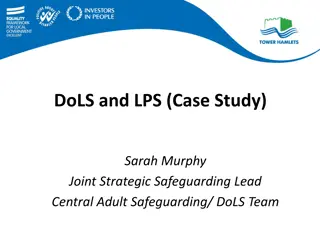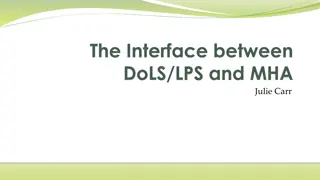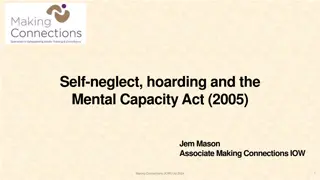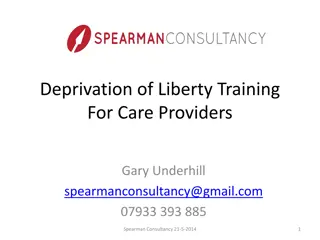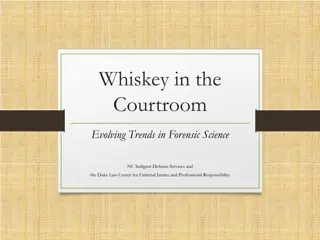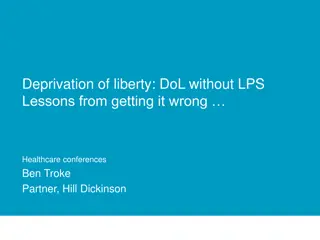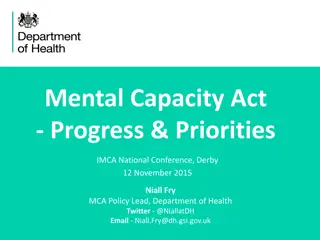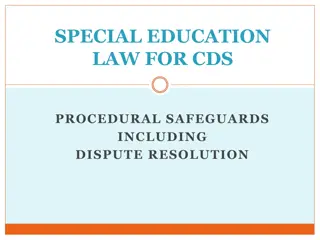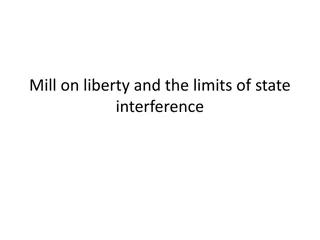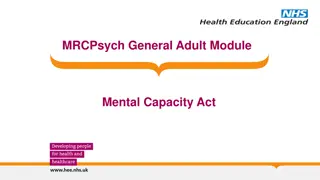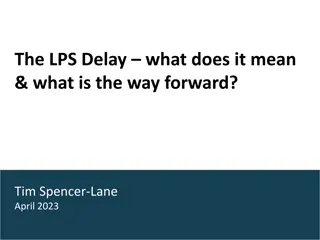Understanding the Mental Capacity Act and Deprivation of Liberty Safeguards
Explore the key concepts related to the Mental Capacity Act and Deprivation of Liberty Safeguards, including human rights, consent, decision-making, and supporting autonomy. Discover the importance of valid consent and the role of professionals in ensuring individuals have the information and capacity to make informed choices.
Download Presentation

Please find below an Image/Link to download the presentation.
The content on the website is provided AS IS for your information and personal use only. It may not be sold, licensed, or shared on other websites without obtaining consent from the author. Download presentation by click this link. If you encounter any issues during the download, it is possible that the publisher has removed the file from their server.
E N D
Presentation Transcript
The Mental Capacity Act & Deprivation of Liberty Safeguards: An Introduction Phil Carter (Mental Capacity Act / Deprivation of Liberty Safeguards, Training & Development Worker) 2018
Introductions Name Job Role Any questions?
Mental Capacity Act Human Rights Consent to care and treatment Assessing Capacity (Supported Decision Making) Best Interest Decision Making Restraints & Restrictions Deprivation of Liberty Today s topics For discussion:
Human Rights Question: Which human right, gives you the right to make your own choices (aka:the right to autonomy)?
Human Rights (pg.4) The ECHR protects your essential rights, including the rights to: Article 1 : Obligation to respect human rights Article 2: Right to life Article 3: Prohibition of torture Article 4: Prohibition of slavery and forced labour Article 5: Right to liberty and security Article 6: Right to a fair trial Article 7: No punishment without law Article 8: Right to respect for private and family life Article 9: Freedom of thought, conscience and religion Article 10: Freedom of expression Article 11: Freedom of assembly and association Article 12: Right to marry In essence we have the right to self-determination, the right to choose our own path. All staff are there to promote and uphold the Human Rights of the people we support.
Consent When do you require consent from the people you support? What support do you need to provide if consent is going to be valid?
Consent : Role of Professionals (Pg. 5) To give valid consent or permission the person needs to have: Information about the decision Free choice to make the decision without being unreasonably pressured or forced The Mental Capacity to be able to consent or refuse To help someone to decide whether or not to consent we MUST EXPLAIN: why the care or treatment is needed the options available and what they entail. what is likely to happen if the person does consent what is likely to happen if the person refuses the care or treatment We need to support the person on all occasions when their consent is required.
Consent Imagine I was a new resident accessing your service (I arrived in the service yesterday), how would you support me to get up in the morning? I need support with all daily tasks (I am also doubly incontinent), I have limited mobility and use a k-walker I also have a diagnosis of Alzheimers
The Mental Capacity Act 2005 (pg.6) Code of Practice Anyone acting in professional role Anyone with legal authority to make decisions on behalf of person lacking capacity Anyone paid for acts in relation to a person who lacks capacity. Guide for family carers
Introducing the MCA We should presume that adults have the capacity to consent to or refuse unless it can be established that they lack that capacity. Each assessment of an individual s capacity should relate to a specific decision The Mental Capacity Act Code of Practice stipulates that professionals should never express an opinion on a person s lack of capacity without carrying out a proper examination and assessment; MPS: Consent to Medical Treatment in the UK
Mental Capacity Act To Understand The Mental Capacity Act You Need to understand the 5 principles ? ? ? ? ? Exercise: What are the 5 Principles of the MCA in the correct order?
MCA : 5 Principles 1 Presume Capacity 2 5 Practicable support Less restrictive Capacity LackCapacity 3 4 Unwise decisions Best interests
Mental Capacity Act Principle 1 A person must be assumed to have capacity unless established that she/he lacks capacity Incapacity cannot be simply based on: Appearance/ age/ gender/ condition/ diagnosis/ behaviour/ race Incapacity to make other decisions An unwise decision Indecision
Mental Capacity Act Look at these statements: what do you think about them in relation to the first principle: All people with a learning disability lack capacity to make any decisions No one with dementia can look after any money This lady lacks all capacity to do anything whatsoever (this is a real note written by a doctor in the care file of a resident in a nursing home)
Mental Capacity Act Principle 2 Supported decision A person is not to be treated as unable to make a decision unless all practicable steps to help him/her to do so have been taken without success
Mental Capacity Act Principle 3 A person is not to be treated as unable to make a decision merely because he/she makes an unwise decision. Everybody has their own values, beliefs, preferences and attitudes. A person should not be assumed to lack the capacity to make a decision just because other people think their decision is unwise. This applies even if family members, friends, healthcare or social care staff are unhappy with a decision.
Unwise Decisions Example: Reginald feels lucky with the lottery this week What are the questions you would ask?
Case Scenario In re C (Adult: Refusal of Treatment) Consider the English decision In re C (Adult: Refusal of Treatment). C was a patient at a secure hospital. Doctors diagnosed C with paranoid schizophrenia and found he had a number of delusional beliefs, including a belief that he was a great doctor who had a 100 percent record of restoring injured limbs. Ironically, C suffered an injury to his foot that developed gangrene. His doctors informed him there was an eighty-five percent chance he would die if the foot were not amputated. C understood his diagnosis and prognosis but disagreed with the doctors and refused the treatment; believing that God would heal him of any medical problems. Taken From Entering the Fog: On the Borderlines of Mental Capacity, Jonathan Herring, Exeter College, University of Oxford
Case Scenario In re C (Adult: Refusal of Treatment) The court found C to be competent and to possess mental capacity. The court reasoned that C understood the doctors' prognosis, but that he disagreed with them. His disagreement did not render him incompetent. C was able to comprehend and retain the information that his doctors told him, and to reach a decision based on that information. The fact that many would find his decision bizarre or irrational does not mean that he should have been judged incompetent.
Mental Capacity Act Principle 4 Best interests One of the key principles of the Act is that any act done for, or any decision made on behalf of a person who lacks capacity must be done, or made, in that person sbest interests. That is the same whether the person making the decision or acting is a family carer, a paid care worker, an attorney, a court-appointed deputy, or a healthcare professional, and whether the decision is a minor issue like what to wear or a major issue, like whether to provide particular healthcare. More about this later
Mental Capacity Act Principle 5 Less Restrictive Where there is more than one option, it is important to explore ways that would be less restrictive or allow the most freedom for a person who lacks capacity to make the decision in question. However, the final decision must always allow the original purpose of the decision or act to be achieved.
So how do we assess capacity? (Page 9)
The 2 Stage Assessment of Capacity For all assessments of capacity or as we will call it supported decision making you will use a two stage assessment. Anyone assessing someone s capacity to make a decision for themselves needs to assess
Stage 1 Part 1 Anyone assessing someone s capacity to make a decision for themselves should use the two-stage test of capacity. Does the person have an impairment of the mind or brain, or is there some sort of disturbance affecting the way their mind or brain works? (It doesn t matter whether the impairment or disturbance is temporary or permanent.) Question: What examples can you think of?
MCA Assessment : Stage 1 Examples of an impairment or disturbance in the functioning of the mind or brain may include the following: conditions associated with some forms of mental illness dementia significant learning disabilities the long-term effects of brain damage physical or medical conditions that cause confusion, drowsiness or loss of consciousness delirium concussion following a head injury, and the symptoms of alcohol or drug use. (MCA Code of Practice, Section 4)
The 2 Stage Assessment of Capacity Stage 1: (diagnostic test): Does the person have an impairment of or a disturbance in the functioning of the mind or brain? If so, does it cause an inability to Stage 2: (functional assessment): Understand the relevant information Retain the relevant information Use or weigh the relevant information Communicate the decision You must provide Information including reasonably foreseeable consequences Remember Principle 1-3
Understanding & Retaining What ways can you make information easier to understand and retain? It is normal for people not to remember information correctly It is normal for people s memories to be selective Not a memory test and memory can be assisted
Use & Weighing of Information (Pg. 10) 4.21 For someone to have capacity, they must have the ability to weigh up information and use it to arrive at a decision. Sometimes people can understand information, but an impairment or disturbance stops them using it. In other cases, the impairment or disturbance leads to a person making a specific decision without understanding or using the information they have been given. 4.22 For example, a person with the eating disorder anorexia nervosa may understand information about the consequences of not eating. But their compulsion not to eat might be too strong for them to ignore. Some people who have brain damage might make impulsive decisions regardless of information they have been given or their understanding of it. MCA Code of Practice Chapter 4 3 This issue has been considered in a number of court cases, including Re MB [1997] 2 FLR 426; R v Collins and Ashworth Hospital Authority ex parte Brady [2001] 58 BMLR 173
Communication Exercise (pg 11): Story telling. In your pairs decide who will be the story teller and who will be the listener. Story-teller Take a minute to think of a story about your childhood. You are going to tell this story to your partner. However, you cannot use any words. You may use gestures or pictures. Think about how you are going to do this. What are the important events in your story? Who else does it involve? What emotions would you need to convey? Listener You are going to be told a story about the story-tellers childhood. However the story-teller cannot use any words. The story can only be told in gestures, pictures, sounds, mime
Section 5 MCA The Mental Capacity Act says (in section 5) That If we do an act connected to a person s care or treatment and We can show that the person lacks capacity to consent to the action we want to carry out, and We can show that it is in the person s best interests that we carry out the action. Then we do not incur any liability that we wouldn t have incurred if the person had capacity to consent and had consented. In other words as long as we can show why we think the person is unable to consent and also that what we are doing is in the person s best interests, then we are acting within the confines of the Mental Capacity Act
Supported Decision Making Remember the 2nd principle: A person is not to be treated as unable to make a decision unless all practicable steps to help to do so have been taken without success If we add this to the capacitytest it means that we have to take all practicable steps to help the person understand, retain, use or weigh and communicate Go to page 12 Complete Exercise Mr Craven For examples of recording look to page 13
Planning for the Future (Pg.14)? Next of kin is not recognised in law No adult can consent on behalf of another adult unless with specific legal authority: Enduring Powers of Attorney: Property and Affairs (valid if created before launch of MCA) Lasting Powers of Attorney: Property and Affairs Lasting Powers of Attorney: Personal Welfare Deputy appointed by the Court Office of the Public Guardian Appointee Department for Work and Pensions Other ways of planning for a time when you may be unable to make a decision Advanced decisions (Legal) Advanced Directives / Living Wills (Not Legal)
Best Interests Checklist Will the person have capacity in the future to make this decision? Can the decision wait? Don t make a decision just based on the person s age, condition, disability etc. We are making a decision about this person and not this type of person If the decision is about whether or not to give treatment that will keep the person alive, we must not be motivated by the desire to bring about the death of the person. How can the person still be involved in the decision? Is it in their best interests to do what they want to do? What do we know about the person s past and present wishes about the decision? Has the person written anything down? What do we know about the person s beliefs and values? What would the person have thought about if they were making the decision? What can other people tell us about the person s wishes, feelings, beliefs and values, especially those caring or concerned for the person
Independent Mental Capacity Advocates (Pg. 19) Independent Mental Capacity Advocate (IMCA) Service Does the decision relate to: Serious medical treatment OR Long term accommodation change OR Safeguarding Adults Process OR A Care Review AND Does the person Lack capacity AND Have no one else appropriate to consult (see IMCA guidance) If the answer is YES to both parts a referral MUST be made to the IMCA service. Referral to be made to IMCA service? YES NO
Do you use restraint in your service? What is the difference between restriction and restraint? ?
Restraint and the MCA In groups list 10 restraints and restrictions that are used in health and social care settings? How and when can these be justified in law?
Page 20 of your books Restraint: Use or threat of force when a person resists Restricts the person s liberty of movement, whether or not they resist Code of Practice 6.40 6.53
Restraint 6.41 Any action intended to restrain a person who lacks capacity will not attract protection from liability unless the following two conditions are met: the person taking action must reasonably believe that restraint is necessary to prevent harm to the person who lacks capacity, and the amount or type of restraint used and the amount of time it lasts must be a proportionate response to the likelihood and seriousness of harm.
Restraint and Care Plans It became clear that the level of physical restraint being used by carers in Y House was greater than acknowledged in the care plan (and indeed, even in an amended care plan). As Baker J noted: 25. In supplemental submissions, Ms Butler-Cole on behalf of the Official Solicitor submitted that in any case in which physical restraint is used in the care of an incapacitated adult, any physical intervention, whether considered to amount to restraint or not, should be recorded in the care plan maintained by the service providerand monitored by the statutory body responsible for commissioning the person s care. Furthermore, precise details of all physical interventions should be ascertained and documented as part of the Deprivation of Liberty Safeguards process or indeed any best interest assessment from direct discussion with care staff implementing the interventions. AJ, 2015
MCA & DOLS Both Mental Capacity Act & Deprivation of Liberty Safeguards come with a Code of Practice
A Deprivation of Liberty has 3 elements: Objective element: Is there a deprivation..? : This part has 2 questions which are, is the person: not free to leave? under continuous/complete supervision and control? Deprivation of Liberty (Page 25) Subjective element: does the person lack capacity [i.e the person cannot consent (because they do not have the capacity to do so) to that confinement]? Imputable to the state: are the arrangements made by a public body ?
MCA Principles 1. Assume capacity 2. Provide all practicable help 3. Respect decision (unwise incapacity) 4. Take best interests decisions 5. Take less restrictive option
Thank you for your time. Further questions can be directed to: phil.carter@cambridgeshire.gov.uk 07795 302092 or: james.codling@cambridgeshire.gov.uk 07584 490240 DoLS Office: 01223 715 581




